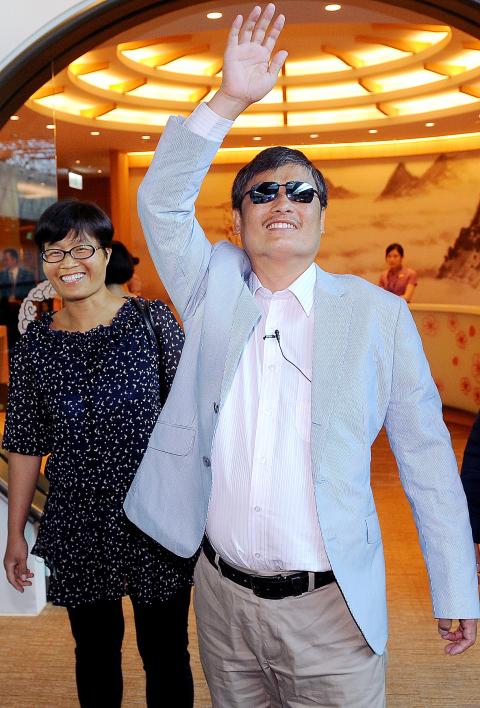|
Chinese activist says
impressed by passion of nation
Staff writer, with CNA

Chinese civil rights activist
Chen Guangcheng waves to the media before leaving Taiwan yesterday after an
18-day visit. Chen said that he was deeply touched by his time in Taiwan.
Photo: Chu Pei-hsiung, Taipei Times
Chinese civil rights activist Chen
Guangcheng (³¯¥ú¸Û) said yesterday before leaving Taiwan to return to the US that
he was impressed by the passion of Taiwanese during his 18-day visit.
Chen said in Taoyuan that he met many Taiwanese democracy advocates who had
sacrificed their freedom in Taiwan¡¦s democratization process, and listened to
their experiences, which filled him with vitality.
Although some people had told him that Taiwan¡¦s democracy remains incomplete, he
said the country has already taken an important step.
He described Taiwan¡¦s democratic society as a set of scales, with political
parties the weights and the people responsible for adjusting the balance.
Asked about the future relationship between Taiwan and China, Chen said this
should be decided by the people rather than political authorities, while the
future development of the two sides should be based on human rights.
He said he would continue to strive for human rights, democracy and freedom of
choice, and that he is willing to visit any country in the world to further this
cause.
Chen, who lost his sight during childhood, arrived on June 24 for an 18-day
visit at the invitation of the Taiwan Association for China Human Rights.
The 41-year-old activist made world headlines in April last year when he fled
house arrest in rural China and sought refuge at the US embassy in Beijing.
The Chinese authorities subsequently agreed to let him leave for the US along
with his wife and two children, and he has been studying at New York University
since then.
Chen was sentenced to four years and three months in prison in 2006 for his
human rights advocacy and his vocal opposition to China¡¦s forced abortion
policy. He was put under virtual house arrest after being released in 2010.
|
![]()
![]()
![]()